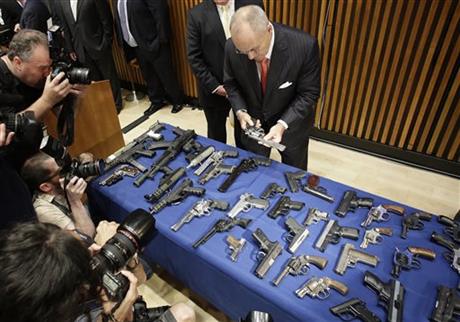
By TOM HAYS
New York Police Commissioner Raymond Kelly looks at some of the guns seized as part of gun smuggling between the Carolinas and New York, Monday, Aug. 19, 2013 in New York. Authorities say couriers smuggled 254 guns into New York City by stashing weapons in their luggage on discount buses. The men were caught in a police sting that netted 254 weapons in 45 transactions since last year. (AP Photo/Mark Lennihan)
NEW YORK (AP) — A pair of gunrunners smuggled firearms into New York City by hiding them in luggage they carried on discount buses offering cheap fares and lesser odds of getting caught, authorities said Monday.
The men were caught in a police sting that netted 254 weapons in 45 transactions since last year — the largest total from a gun case in recent memory. One of the guns was an assault rifle that was disassembled and transported in a girlfriend’s zebra-striped bag, authorities said.
The alleged smugglers, Walter Walker and Earl Campbell, were among 19 people arrested in New York, North Carolina and South Carolina as the result of a 10-month investigation. Also charged was an operator of a Brooklyn music recording studio where authorities said some of the deals took place.
Officials from the New York Police Department and the Office of the Special Narcotics Prosecutor announced the arrests Monday, citing it as another example of a persistent black market in which guns from the South can sell for three times their original price in the city.
The case — built largely on the work of an undercover NYPD investigator and cellphone wiretaps — was a spinoff of a drug investigation in Brooklyn. Authorities said they discovered that Walker, 29, of Sanford, N.C. and Campbell, 24, of Rock Hill, S.C., were trafficking guns separately but using the same middleman in New York City.
Walker and Campbell were arrested earlier this month in their home states, authorities said. The names of their defense attorneys were not immediately available.
The two tapped a variety of suppliers in their hometowns, authorities said. Some guns were obtained on the black market, while others were bought from gun dealers using straw buyers to get around one-gun-a-month restrictions.
“The problem is that the gun laws passed now, so it’s like now I can only buy a gun from a gun store every 30 days,” Campbell complained in one conversation, according to an indictment. “So I had to, like, pay different people to keep buying different guns.”
Before heading to New York, Campbell would obtain photos of the guns his suppliers were offering and send the images to the undercover officer. Both defendants would travel to the city carrying a dozen or more handguns, rifles and shotguns in bags that were stowed in luggage compartments of Chinatown-based carriers also favored by drug couriers.
One of the discount bus companies charges $60 one-way from Raleigh, N.C., to New York. The fare is about half that charged by Greyhound, which, unlike the Chinatown buses, requires identification for boarding.
Walker met two times last year with the middleman and the undercover officer at the Brooklyn recording studio to sell the undercover firearms, the indictment said. He also alleged sold weapons to the undercover in April in Manhattan.
In January, the undercover met with Campbell and his girlfriend, who was carrying assault rifle parts in her zebra-striped suitcase, authorities said. The girlfriend tried to assemble the weapon using an instructional video she called up on her smartphone. When she failed, the undercover bought the pieces anyway for $1,100.



